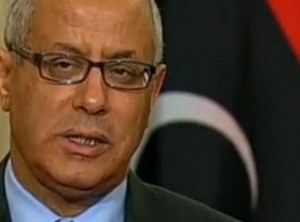 Making a public statement on Thursday, the Libyan Deputy Prime Minister Abdulkarim Sadikk clearly missed the mark when he stated that Libya was safe and security was under control. The problem with Mr. Saddikk statement is that nothing could be further from the truth. Early Thursday, Mr. Saddikk’s boss, Prime Minister Ali Zeidan was simply kidnapped from his room at the Corinthia Hotel. Yes, only in failed state do we see these kinds of events and to speak of security when the Prime Minister is abducted simply defies logic.
Making a public statement on Thursday, the Libyan Deputy Prime Minister Abdulkarim Sadikk clearly missed the mark when he stated that Libya was safe and security was under control. The problem with Mr. Saddikk statement is that nothing could be further from the truth. Early Thursday, Mr. Saddikk’s boss, Prime Minister Ali Zeidan was simply kidnapped from his room at the Corinthia Hotel. Yes, only in failed state do we see these kinds of events and to speak of security when the Prime Minister is abducted simply defies logic.
Mr. Ali Zeidan was finally free about four hours later, but eyewitnesses described the abductors coming with a big show of force, having come in some 150 cars, owned by the Committee of the Libya Revolutionaries. Eventually a sub-set of that group carried out the abduction.
It is unclear as to why PM Zeidan was abducted, but it is probably linked to the perceived endorsement by the Libyan government of the American operation that led to the capture of Al Qaeda’s Anas Al Liby.
However, what is really shocking is that Zeidan’s abductors are part of the government’s security system. The men who took Zeidan are part of the Interior Ministry’s anti-corruption department. That special unit, essentially composed of heavily armed ex-rebels, was established by the President of Libya’s parliament, Mr. Nouri Abu Sahman, who has played a key role in negotiating the release of Zeidan. But the existence of a government within the government is precisely what undermines the credibility of Libya.
For the anti-corruption department, it was not an abduction but an arrest, because of the alleged acceptance by Zeidan of the American action to seize Al Liby. The kidnappers say they have obtained an arrest warrant from a magistrate.
Regardless, Libya has clearly descended into chaos, and as we said in many articles in the past, only a federal model of governance, where regions are administratively autonomous and in charge of their security, under the umbrella of a Libyan nation would save that country. Until then, and as long as governance is centralized in the hands of a few men, Libya will continue to struggle.
—
Update 10/10/2013 | 12:36 PM: It was revealed that the release of Mr. Zeidan was not a voluntarily released from his abductors. Apparently a commando unit intervened, using force to free him.




